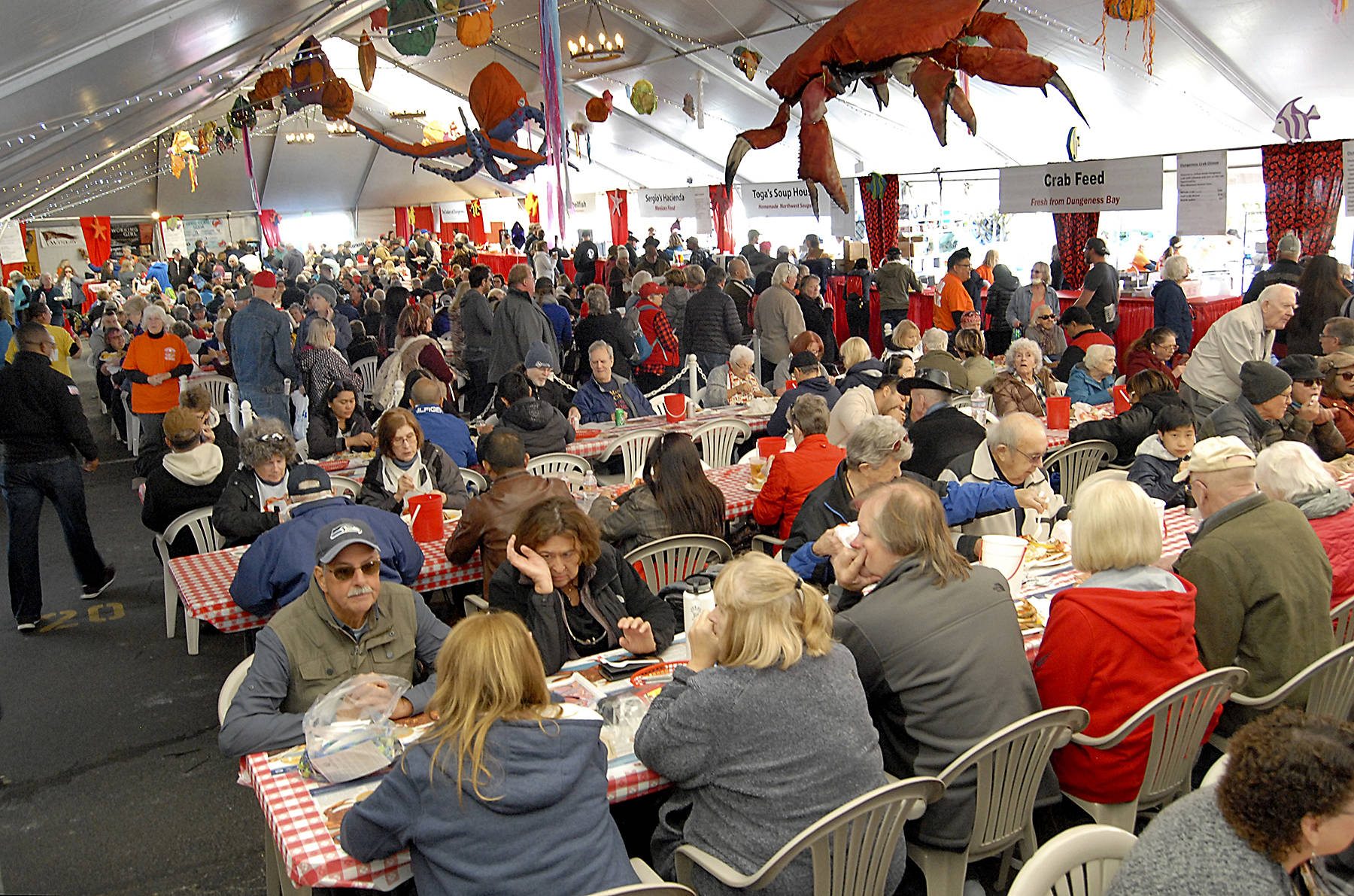The 19th annual Dungeness Crab & Seafood Festival has been canceled, board members announced Tuesday, as October’s annual crustacean celebration becomes the latest major event to feel the pinch of coronavirus-related uncertainty.
Festival executive director Scott Nagel said organizers made the decision after weighing a number of COVID-19-related factors.
“I’ve been attending all the (Clallam County Public Health) briefings (virtually),” Nagel said. “There are several problems with our timeline. Phase 4 (of the state’s Safe Start reopening plan) allows for gatherings of 250 or more people, but the soonest we would know about Clallam County’s Phase 4 status is early September. By that point it’s too late to advertise. And this is an expensive production that takes months to produce.”
Nagel said the three-day festival draws crowds of up to 20,000 people and fills “every hotel room in the region.” He didn’t have up-to-date financial details of the event’s impact on the North Olympic Peninsula economy, but conservative estimates are in the multiple millions of dollars.
“We draw people from all over the world,” Nagel said. “We had visitors from 25 states and seven foreign countries in 2019.”
Canadian citizens make up a large number of festival attendees, Nagel said, with many passengers riding across the Strait of Juan de Fuca from Victoria aboard the MV Coho ferry.
“The Coho brings us over 3,000 people during the festival,” Nagel said. “The Coho is also not likely to be running in October. You can look up what MV Coho co-owner Ryan (Malane) said in that article, but it’s unlikely to be operating.”
Malane addressed the ferry’s operations in a May 22 Peninsula Daily News article that discussed Canadian restrictions on nonessential travel due to the coronavirus pandemic.
The 1,000-passenger ferry has sat idle since March 29, and Canadian travel restrictions have a 20 percent chance to be eased by December in a best-case scenario, according to Destination BC, the provincial government’s tourism marketing corporation.
Nagel said purchasing crab and other supplies for the event was impossible under these uncertain conditions.
“We purchased 18,000 pounds of crab last year,” Nagel said. “With all this, there’s no way to know what would be an appropriate order. We have been able to adjust for weather and other factors in the past, but there would be no way to do so this year.
“This is still a free festival,” he added. “We receive revenues from booth fees and sponsors which are very important, but the main source is the food and beverage sales from our crab dinners.”
And Nagel said coronavirus-related distancing requirements also would have altered the look of the festival.
“On top of all that we have all the COVID physical distancing requirements. There can be outdoors events in Phase 4, but our big tent, which holds 1,000 people, we would be treated the same as a restaurant and our seating capacity would be lowered.”
Nagel has produced many large events and festivals for decades. His sense is these outings are not likely to return until 2021.
“The general conversation I have with other festival directors is these big events will not return at all in 2020, so they are planning for 2021.”
CrabFest history
Nagel said the festival began as a small event featuring a crab derby and a Bella Italia cooking demonstration on Port Angeles’ City Pier in 2001, moved to and quickly outgrew a too-small space at Sequim’s John Wayne Marina in 2002, and came back to its downtown Port Angeles location along Lincoln Street in 2003.
“We started the event to be in the shoulder season for tourism,” Nagel said. “The first week in October is the first week of the commercial crab season, so we have that fresh harvest available right here on our doorstep.
“In 2003, we moved back to downtown Port Angeles and the Red Lion Hotel parking lot and have added tent size every year. We now have seven tents that make up 17,000 square feet.”
Food booths on City Pier also are part of the proceedings.
Nagel said the festival was popular right out of the gate, but said it has taken years to grow.
“Around year 10 it started to get national publicity, and has been listed in magazines as the nation’s Best Seafood Festival,” he said.
“The biggest boost was when the Coho started its walk-on program. All of a sudden we had thousands more Canadian visitors. And people love it; the return rate is high, so the loss of the Coho is huge.”
Nagel said plans are already in the works for the 2021 event.
“This is difficult and sad for all of us as we love this event as much as those who come celebrate with us, but new plans and ideas will keep us busy throughout the next year and (we) look forward to a healthier and more exciting CrabFest on Oct. 9-11, 2021.”



